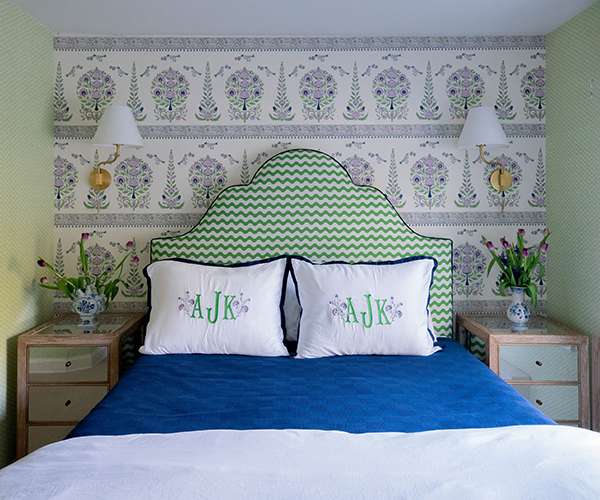In the shaping of today's society, television, movies, computers and videos have dramatically altered the way people perceive everything around them. In an instant, people are compelled or repelled by what they see. That's particularly relevant in the real estate market, where home sales begin with the buyer's first impression.
"We live in such a visual society and today's homebuyers buy visually," says Suzanne Gallmann, a real estate agent for The Gallmann Group at RE/MAX Haven Realty in Solon.
For these reasons, Gallmann emphasizes the importance of properly preparing and "staging" a home for sale. In doing this, every detail must be scrutinized from the perspective of prospective buyers.
"As real estate professionals, we tell sellers that when you look at your house, you've got to put on the eyes of your potential buyers," says Gallmann.
Curb appeal
Joanne Zettl says sellers should never underestimate the importance of curb appeal because buyers form their first impression of a home the minute they turn into the driveway.
"You have to look at your home as if you're a buyer sitting in the car at the curb," says Zettl, manager of Realty One Real Living in Chagrin Falls. "In a lot of cases, that determines whether they'll come inside."
Pretend you're a buyer and start taking notes as you survey the outside of your home. Ponder the appearance of your driveway. Is it free of clutter, debris and weeds? Are your shutters, gutters and garage door rust-free and properly aligned? Is the roof lacking any shingles? Is the fence leaning or begging for repair? Does anything look unkempt or dingy?
If there's anything other than healthy plants, flowers and ground cover in your lawn beds, you need to weed. Is mulch freshly turned? Are shrubs and trees trimmed? Are weeds growing between sidewalk cracks? If your yard is barren and boring, says Zettl, you don't need to call in a landscaper but you should do something.
"A very small investment of under $100 can make a big difference because you can liven up the landscaping with some flowers and shrubs," Zettl says.
Around back, does the deck or fence need to be power washed or re-stained? What about rusty outdoor furniture? Have you discarded clutter in the garage, and swept and hosed it down?
If it's summer, is the lawn mowed? If it's autumn, are the leaves raked? If there's white stuff on the ground, make sure your drive and walkway are free of snow and ice.
As you reach your front door, notice that even the mailbox makes an impression. Is the outdoor light fixture swaddled in spider webs? Is the paint in good shape on your cement porch? Are there tears in the storm door screen? Does the latch lock? Doorbell work?
"Many times we find that buyers will make their decision as they walk up the driveway and that's why staging of the exterior of your home is as important as the interior," says Zettl. "Of course, the home will continue to sell itself as they walk through."
Floor-to-Ceiling Sparkle
Before you roll out the red carpet to potential buyers, says Gallmann, make sure your house sparkles from floor to ceiling.
If you usually contract with a maid service, this step in the staging process may not seem so daunting. If you customarily clean your own home, consider hiring a cleaning company because not only is this checklist lengthy, it's a justified moving expense and essential to a sale.
Start by washing the walls, scouring countertops and scrubbing appliances. Remove mineral deposits from plumbing fixtures, and recaulk tubs and tiles if necessary. Polish wood furniture and floors. Have the carpets shampooed. Get windows squeaky clean, and check that blinds and window treatments are dust free. Rid the ceiling of spider webs. Dust all lighting fixtures and ceiling fans. Spruce up the fireplace, including screens and accessories.
Repair scuffed or cracked woodwork. Lubricate squeaky or sticky hinges on doors and cabinets. Patch holes in walls and repaint wherever needed, especially in areas discolored by sunlight. Check for peeling wallpaper, but think twice about re-pasting. Zettl says it's imperative to remove wallpaper entirely, because people want to see clean walls, preferably painted in cheerful colors.
Divide, Conquer and De-Clutter
As potential buyers tour your home, they're pondering available space. Since "less is more," Zettl says sellers must "de-clutter" to maximize space.
"Buyers can't always see past someone's clutter," she says. "So if you de-clutter, arrange and organize everything, it makes rooms look larger and adds value to your home."
Before you move, you'll have to pack whatever you don't pitch, sell or donate, says Zettl. Do it now and you reap the benefits of a more attractive, larger-looking home, plus you'll have accomplished a major task before closing.
Start by boxing up knickknacks, framed photos and accessories you can live without until you move. Clear kitchen and bathroom countertops as much as possible to maximize space. De-clutter closets, realizing the better organized a closet, the larger it appears. Pack away seasonal clothing. Donate garments you haven't worn in a year. Line up shoes on the floor.
Before stashing boxes somewhere in your house or garage, consider renting a temporary storage facility, where you can also store some of your furniture. Why? Because buyers cannot necessarily envision their furniture in your home, and as they're touring the rooms, they're imagining your house as their home — in the way you present it. If rooms are cluttered with furniture, they imagine their furniture won't fit either.
In renting a storage facility, says Zettl, you're also freeing space in your attic, basement and garage — areas that buyers also consider for purposes of storing their own possessions.
"We want buyers to be able to see all of the features of a home, but if any part of the house causes a room to be cluttered the buyer will not be able to see past that," says Zettl.
Keep in mind that professional inspectors must also have access to exterior walls during home inspections. On that note, Zettl encourages sellers to have a pre-inspection to determine what's actually "under the hood."
"The home inspection process is a very stressful time for sellers because they're wondering what the buyer might find," says Zettl. "If you have a pre-inspection, you won't have any surprises later and have to negotiate a price because of anything that turns up."
Senses and Sensibility
Sellers stand a better chance of making a sale when they cater to the senses of buyers. Little touches can make a big impression, like fresh flowers on the dining room table and a colorful throw on the sofa.
Light the way by turning on all lights and opening your window treatments. This enables people to view your rooms as they should be presented. Even in closets and storage rooms, lights create the illusion of largeness. For evening showings, ensure there are no burned-out bulbs in outdoor fixtures, including landscape lighting.
When it comes to music, rock 'n' roll will never die — but it can kill a prospective real estate sale. "It's always nice to walk into a house and have some relaxing music playing," says Gallmann. "But make sure it's soft, pleasant background music that's only there to fill a void."
What people smell in your home can be a big problem, especially if there are odors caused by pets, dampness or smoking. Common sense dictates that when your home is on the market, carpets and drapes should be cleaned, and smokers should not light up inside. "When people try to counteract smells with potpourris, candles and other aromas, that compounds the problem," says Gallmann. "While it's nice to smell cinnamon coffee cake baking in the oven, it's better not to have other smells introduced into the house."
For the physical comfort of buyers, turn on the central air system if it's warm and sultry outside. If it's a breezy day, open the windows to welcome the fresh air and potential buyers.
With or Without Warning
Once the "for sale" sign goes on the front lawn, realize that real estate agents sometimes receive calls from buyers who request impromptu showings. To accommodate them, adapt to a routine in which you can be prepared with an hour's notice.
Before leaving your home every day, remove all newspapers and magazines, mail, clothing — anything that detracts from an otherwise spotless appearance. Are countertops clean? Sinks empty? Are dishes stored in cupboards or stashed in the dishwasher? Are beds neatly made?
"Remember the adage about having just one time to make a good impression," says Gallmann. "If they don't like it the first time, they won't come for another look."



